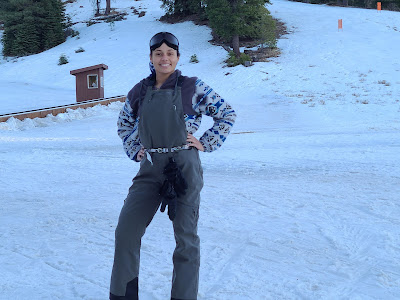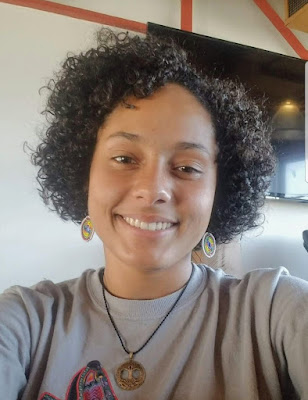Cal-Bridge scholar and co-founder of Astronomers for Planet Earth (A4E) Imani Ware featured on AAS Women in Astronomy blog
Published: September 7, 2021
Publication: Women in Astronomy
Author: Bryne Hadnott
This feature is part of our ongoing series about the amazing women at Astronomers for Planet Earth (A4E), a global network of astronomers and astronomy enthusiasts dedicated to offering their unique perspective to the fight for climate justice. For this post, we’ll hear from Imani Mairae Ware, an undergraduate student studying astrophysics at San Francisco State University (SFSU).
If you’re interested in learning more about A4E’s work combating global climate change and want to get involved, join them here at: https://astronomersforplanet.earth/join-us-1. And be sure to check out A4E’s white paper on what astronomers (like you!) can do to address the climate crisis: Astronomers for Planet Earth: Engaging with the Public to Forge a Sustainable Future.
What is your current career and how did you end up there?
Right now, I am attending San Francisco State University to study astrophysics for my Bachelor’s degree. I decided to study astrophysics after taking a couple of physics classes in high school with my amazing and inspiring teacher, William Lemei. Our class watched a TEDx talk by astrophysicist Dr. Alex Fillipenko about his dark energy discoveries and after that, I knew I wanted to study astrophysics. Although I love studying the sky and the physics of the universe, I also love to build structures and design real-world systems, like an engineer. So to get the best of both worlds, I planned to study astrophysics to get a more fundamental understanding of aerospace engineering to take to an industry job. Little did I know that astrophysics was more than a fundamental understanding of aerospace, but an in-depth analysis of physical and theoretical micro and macro systems. I’m so happy I chose this route because I now know more about this world and the universe than I could have ever imagined back in high school.
What is your role in Astronomers for Planet Earth (A4E)?
I am one of the original members and co-founders of Astronomers for Planet Earth (A4E). While President of the Women in Physics and Astronomy Club, I helped organize A4E’s official debut panel session at the Astronomical Society of the Pacific’s 131st conference hosted at San Francisco State University in 2019. From there the co-founders and I worked on recruiting other astronomers passionate about climate activism and setting the foundation for this blossoming organization. As the word spread, we joined forces with a Europe-based group of astronomers focused on climate change, and from there we have coordinated social media content, membership events, conference talks, and calls to action for observatories around the world. As an undergraduate student taking online classes during the COVID-19 pandemic, I haven’t been as active as I wanted to, but have contributed in any way I can. My next step is to focus on administrative structures to help streamline the onboarding process of new members.
What goals do you have for your role in A4E?
Since a large portion of my time in A4E has been setting up a structure and foundation to make operations easier in the future, the activism side of our mission has been slow to start. One of my goals is to initiate events and meetings to focus on implementing action-based movements. Most companies and organizations that flaunt their eco-friendly initiatives are all talk, no action. I do not want A4E to become one of those organizations and intend to push for more front-line climate activism. I also want to involve more youth and underrepresented groups in the organization to diversify the voices we include in the climate conversation. Since I am still one of a handful of undergraduate students active in A4E, I want to facilitate outreach events to bring more youth activists into A4E and foster a safe space for open discussion. Astronomy is for everyone and everyone is affected by climate change. Anyone who values both astronomy and climate change, regardless of age and background, should have their voices heard in A4E.

Mid-hike at Zion National Park, Imani Mairae Ware takes a moment to appreciate the beauty of the sandstone cliffs.
Describe the first time you made a personal connection between your passion for astronomy and the urgency of fighting climate change.
I don’t really have a specific moment when I made the connection, but after learning that traveling to other planets outside of our solar system is still science fiction, I knew we need to take care of Planet Earth since it’s the only one we have. There really is no Planet B. Most of the other planets and moons in our solar system are currently uninhabitable and will take decades before any colony could be established on those with promising terrain. Of course, interstellar travel is a future possibility, but right now, that technology doesn’t exist. That is why we must take care of our planet and mitigate anthropogenic climate change so we can eventually build the interstellar technology of sci-fi fantasies. We only have a couple of decades to even get close to righting the wrongs we’ve inflicted on this planet. After realizing that the climate change problem is more urgent than interstellar space travel, I decided that the astronomical perspective on climate change could help bring humanity’s focus back from the fantasies of the stars to the realities of the earth.
How does your career in astronomy intersect with the fight against climate change?
Astronomy and fighting climate change are not often connected, but since they are both passions of mine, I made sure to bring these two worlds together. One connection I can think of is that effectively observing space from the ground requires good atmospheric conditions, but as climate change makes the atmosphere less predictable, astronomers must advocate for the planet like we advocate for space science.
How can the astronomical community engage with the climate crisis movement?
Since astronomers have a unique perspective on the climate crisis, we should first create and share educational tools to provide cosmological context to our global problem while presenting effective, concrete solutions. The most effective space astronomers have to share this information is in the classroom and academic community. But since the love for stars and space is not limited to members of academia, astronomers also have the ability to inspire and include everyone into the conversation through the wonderfully curious lens of astronomy.
If you weren’t in the field of astronomy, what would you be doing?
If I weren’t in astrophysics, I would probably be studying aerospace engineering at another university since SFSU doesn’t have aerospace engineering. I would still be volunteering as a climate activist, regardless of my career path, since climate change is everyone’s problem to solve.

In her free time, Imani enjoys snowboarding on the slopes in Pinecrest, CA
Do you have any advice for future astronomers who might also be interested in addressing the climate crisis?
Check out the resources and information pages on the A4E website, join A4E, explore our slack space to connect with other members, and continue to apply climate solutions as often as you can! You are not alone in this fight!



